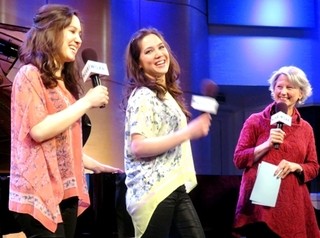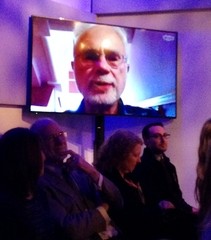|
Back
Four Hands, For Joy New York
Greene Space
03/23/2016 -
Felix Mendelssohn: Allegro brillante, Opus 92
John Adams: Roll Over Beethoven (World Premiere)
Johann Sebastian Bach: Gottes Zeit ist die allerbeste Zeit, 'Actus Tragicus', BWV 106: I. Sonatina (Arranged by Győrgy Kurtág)
Olivier Messiaen: Visions de l’Amen: VII. Amen de la consommation
Witold Lutoslawski: Paganini Variations
Christina Naughton and Michelle Naughton (Pianists), Annie Bergen (Interlocutor)

M./C.Naughton, A. Bergen (© Samuel A. Dog)
The ideal would be words about the music played by Michelle and Christina Naughton last night at the Greene Space. The reality is that the artists’ persona was inextricably linked to their music.
Yes, they both went to Curtis and Juilliard. Yes, they wore the same shoes and almost the same dress. Yes, they looked so similar that WQXR presenter Annie Bergen had to inform the audience of their differences. “Michelle,” she announced “is in pink. Christina is in green.”
And while a sister act in pianos is not unknown, Christina and Michelle Naughton are the only identical twins now on the concert stages of the world.
In fact, in their middle 20’s (and looking far younger), the Naughtons have traveled the world, played with international orchestras, have released two records on Warner Classics, and have won the usual raves. Not only that, but they have introduced two premieres from one of America’s premier composers.
How much, though, is due to that unique persona? And how much from their art?
The answer came from the second half of Felix Mendelssohn’s Allegro brillante for four hands. The opening andante was played with a pleasantly lyrical line. The surprise here was that neither primo orsecondo pianist held the stage. Like playing a hand-game, the two seemed as one body, hands interlaced, repeating and working into the truly brilliant Allegro brilliant. Christina (the lady in green) was at the bass side, and she used the pedal sparingly, so the cantabile was offered with little resonance, quite apt for a pre-Liszt work. And for this the two sisters were well-practiced and quite sparkling.
After the Mendelssohn, we had the One Event which made the recital more than a sister act. John Adams’ Second String Quartet was called–with due allowance to Chuck Berry–Roll Over Beethoven. Still, perhaps inspired by Berry’s classic’s lines, “rockin' in two by two”, he re-arranged it for the Naughton’s “two by two” prowess, so this became a world premiere.

J. Adams in failed Greene Space Skype (© Samuel A. Dog)
John Adams might have explained the piece by a written memo. However, through the miracle of questionable technology, he was Skyped from California into New York for a good 20 seconds.
And that’s when the Skype went out. It simply stopped working. Mr. Adams disappeared and appeared on screen, mimed some words, and Ms. Bergen filled out the rest. Mr. Adams rarely uses electronic paraphernalia in his music, and the failure of this simple gadget gives a reason why.
Not that Roll Over Beethoven needed extraneous elucidation. The two movements were a jolly, witty homage to a pair of Beethoven’s most serious works, the 31st Piano Sonata and the Diabelli Variations. Mr. Adams had “collaborated” with Beethoven previously, and here he continued his partnership with two movements that turned the music’s sculpture into a holograph.
The downward scales, the fragments of tunes, the relics, the shards, the segued themes going through a variety of (what we call in Easter Week) transubstantiations... Nothing was a parody, nothing hinted at Berry’s rhythm ‘n’blues. But the energy of the two movements became a kaleidoscope of discovery and, yes, fun.
It was bravado, if not plain daring chutzpah to play this world premiere without any printed music on their staves. Add to this contrapuntal complexities and the algebraic finesse which the meticulous Mr. Adams composes all his music. But it worked. The Naughtons never were out of synch, never seemed to be trying too hard, and finished the music as happily as it started.
Two of the three ending works perhaps lacked that depth which comes only with maturity. True, the György Kurtág arrangement of Bach, while played well here with four hands, could never reach the devotional attitudes in which the composer and his wife perform this. Nor was the Messiaen more than a beautifully coordinated chorale. For the truth is that these girls, so sparkling, creative and inspired, are happier with the delicious sounds of their own playing than the darker sounds which come from maturity.
My churlish feeling was quickly overlooked with Witold Lutoslawski’s Paganini Variations. While written in a Polish prison camp, it was composed at about the same age as the Naughton sisters, and astoundingly, with the same high spirits.
Which meant that Christina and Michelle Naughton played the work with all the whimsy with which it was composed, embracing the notes the twin virtues of never-failing digital coordination and joy.
Harry Rolnick
|